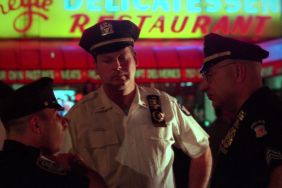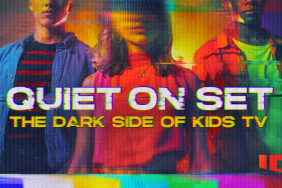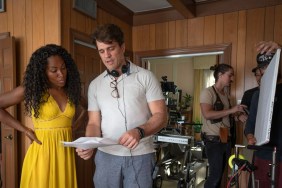
A couple of weeks ago, it was announced that Aaron Sorkin (“The West Wing” and Charlie Wilson’s War) had just bought the rights to The Politician, the book from John Edwards’ former campaign operative Andrew Young.
If you don’t know who Andrew Young is, I’ll give you a quick bio for the creep. He’s the guy who helped one time VP candidate John Edwards cheat on his cancer stricken wife with a bimbo and cover it up. Young continued to help John Boy slink around his wife’s back until the tabloids got a hold of the story. Then Andrew turned around and pimped his story to St. Martin’s Press. Then he signed with WME’s Ari Emanuel in order to get the inevitable movie deal.
Of course there was a sex tape involved. No tabloid story is complete without one these days. Young found the tape and watched it. Instead of releasing it to the public like Kim Kardashian and Ray J did, he used its details to help pimp his book. The whole mess is incredibly tawdry and actually quite boring. But here comes Sorkin to lap it up.
This seems to be where Sorkin lives these days. He tries to class these things up with his Broadway credentials and his Emmy wins. But with The Social Network and now The Politician it appears that Aaron Sorkin is merely a step away from penning that Paris Hilton biopic we’ve all been waiting for so desperately. Any moment now I expect to see Aaron on TMZ chatting away with the kids about what’s happening down at the LAX arrival terminal.
I wouldn’t find this so offensive if Sorkin had something meaningful to say about all these cultural shenanigans. But he doesn’t.
I just took the time to read his script from The Social Network. The only thing that was revealed to me from reading the script was the pathetic state of Hollywood development in 2010. I don’t care that it was listed at number two on the overrated Hollywood “Black List”. It is terrible. Awful in fact.
I’m not sure what Sorkin is trying to say with this script. Described by the studio as an ensemble piece it is anything but. The Mark Zuckerberg “character” is in almost every frame of the movie. It isn’t an ensemble piece.
The problem for the studio is that Mark Zuckerberg (played by Jesse Eisenberg) is obviously the protagonist of the film and Sorkin has created a very unflattering portrait of the Facebook founder. That means Sony is either stuck trying to sell a film with an unlikable central character or claiming it’s an ensemble piece featuring the next Spider-Man (Andrew Garfield) and Justin Timberlake.
The sad thing is that had Sorkin bothered to do his research he could have created a very complex and heroic character. Mark Zuckerberg is a young guy, but he isn’t evil. He created one of the driving cultural forces in world today. Facebook has been used to help elect our first African American President here in the US and link protestors during Iran’s Green Party protests back in 2009. I find that story far more intriguing and interesting than the tale of two butt hurt preppy rowers that Sorkin tells in his script.
Another problem with Sorkin’s The Social Network script. It’s boring. Mind numbingly boring. Oh, and did I mention it’s boring?
I know, I know. I’m going to invoke the wrath of the Fincher fundamentalist crowd. Not since Stanley Kubrick died has there been such fascistic group of hardcore fans. “Fincher’s The Social Network is gonna rock.” they’ll say. He’ll make all those detailed deposition scenes incredibly cinematic. When the lawyers endlessly depose Zuckerberg in two different law suits, Fincher will have that camera going down under the floorboards showing termites gnawing at the wood. Symbolizing the decay of Western civilization that is happening from within. He’s David Fincher dammit! He wouldn’t make Sorkin’s script unless it was going to be brilliant! Yeah, well I saw Benjamin Button.
Back to Sorkin.
What is going on with this man? Here’s a guy who battled drug addiction and got busted at the Burbank Airport for holding. He’s been in the tabloids himself. Now he takes on all these Perez Hilton stories. But instead of finding the good in people he goes for the bad. And he’s not even truthful about it.
A good example is his recent play The Farnsworth Invention. The play, which was once in development as a feature film, has the big, bad corporation win the lawsuit against the actual inventor of TV, Philo Farnsworth. Farnsworth then dies a broken man in abject poverty.
Actually, Farnsworth won the lawsuit and lived a long and fruitful life. That’s quite a difference, Mr. Sorkin. When called on it on Facebook of all things, Sorkin blew the question off claiming that there were many lawsuits and Farnsworth lost as many as he won. Yeah, but he won the big one Aaron. And he didn’t die a broken man!
His adaptation of Charlie Wilson’s War was factually inaccurate. This Facebook script is complete hogwash. If Sorkin wants to write fiction he shouldn’t take on all these real events. Have some cojones, Aaron. Man up and write a spec script. Have Ari Emanuel sell one of those. He’s supposed to be such a hot shot.
I guess what bugs me the most is that Sorkin is always hyped as a serious writer. The thinking man’s answer to the usual Hollywood tripe. Yet, he takes complicated people and situations and turns them into bland stereotypes. Sorkin’s Social Network script is certainly no better.
Case in point. In his script The Social Network, Sorkin boils down a meeting between Mark Zuckerberg and Sequoia Capital. Zuckerberg knew that Sequoia had helped remove his friend and colleague Sean Parker from his position at another firm so he planned a prank.
In Sorkin’s screenplay it goes down like this: Sean and Mark pull up in front of the Sequoia Capital Building. Sean tells Mark to get out of the car and go into the meeting in his pajamas and tell the partners he overslept.
Then Sean tells him that the suits at Sequoia will pitch him anyway, because they want to work with him that bad. At that point, he instructs Zuckerberg to ask which one of the partners is Michael Moritz. And when Moritz speaks up, “You tell him, ‘Sean Parker says fuck you,’ and walk out.”
At that point, Zuckerberg goes into the building while Sean stays in the car. End of scene. The viewer never even gets to see what happens in the meeting.

In real life it went down like this according to numerous sources including the recent book “The Facebook Effect.”
One of the crew’s edgiest pranks in those days was a presentation made to the blue-chip venture-capital firm Sequoia Capital, known in the Valley for a certain humorlessness. Sequoia Zminence grise and consummate power player Michael Moritz had been on Plaxo’s board. Parker saw him as having contributed to his downfall. “There was no way we were ever going to take money from Sequoia, given what they’d done to me,” says Parker. The firm wanted to invest in Facebook, so as a joke the boys offered to pitch the partners a Zuckerberg side project called Wirehog, a peer-to-peer file-sharing program.
Zuckerberg and another partner showed up deliberately late for an 8 a.m. meeting, in their pajamas. They didn’t even make a pitch for Wirehog. Zuckerberg showed a PowerPoint presentation David Letterman-style: “The Top Ten Reasons You Should Not Invest in Wirehog.” It started out almost seriously. “The number 10 reason not to invest in Wirehog: we have no revenue.” Number 9: “We will probably get sued by the music industry.” By the final few points it was unashamedly rude. Number 3: “We showed up at your office late in our pajamas.” Number 2: “Because Sean Parker is involved.” And the number one reason Sequoia should not invest in Wirehog: “We’re only here because [a Sequoia partner] told us to come.” The partners seemed to listen respectfully, recalls Zuckerberg, who says he now regrets the incident. “I assume we really offended them and now I feel really bad about that.”
See the difference? Sorkin’s version shows Mark Zuckerberg to be a mean spirited, spineless patsy. The real life version shows Zuckerberg as his own man, with a sense of humor (albeit a young frat boy sense of humor), a sense of loyalty and a sense of regret. More importantly, the real life version of events is far more interesting and dare I say it – filmic, than the one presented by Sorkin.
It just seems like Sorkin takes the easy way out and the product suffers because of it. I find that development very sad. He used to be one of the most exciting voices in Hollywood. Now he seems to be on track to becoming just another high paid hack.









